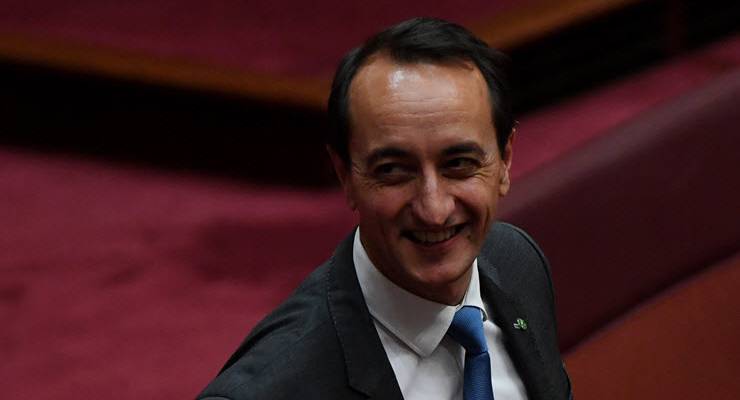
Much has been made of Liberal MP Dave Sharma’s next-level investment portfolio, and his talent for picking stocks has clearly not faded during the economic crisis.
Sharma, a big believer in the tech sector, has managed to back some of the biggest winners of the Australian tech market, many of which are thriving during the pandemic.
Last week he picked up more shares in buy-now pay-later juggernaut Afterpay, which is booming thanks to the downturn as consumers turn to online credit for purchases. He previously held shares in Afterpay’s rival, Zip Co.
He also bought shares in an investment fund that tracks the performance of US tech giants Facebook, Amazon, Google and Netflix — companies which, despite the global economic downturn, have amassed wealth and influence in ways not seen in decades.
Sharma has always had his finger on the pulse when it comes to picking shares, and many of his investments are in widely-held blue chip companies.
But a more unusual investment is Nearmap, an Australian company that specialises in high-tech aerial photography.
Nearmap provides high-resolution 2D and 3D imaging of buildings and infrastructure, primarily for use in the telecommunications, utilities and construction industries. It has also developed an artificial intelligence product that can analyse images for details such as how many swimming pools or solar panels are in a neighbourhood.
The company has shown resilience to the downturn, in part because of the amount of government work it has picked up.
According to Austender, Nearmap has secured several federal government contracts in 2020 worth a total of $710,000. A single contract with the Australian Bureau of Statistics (ABS) was worth $429,000.
There’s no suggestion Sharma has any inside knowledge about the contracts. But it raises the question: should MPs be allowed to hold shares in companies that do business with the government?
Sharma told Crikey that as a member of parliament – and not part of the executive – he had “no role in or visibility of government contracts awarded, including to Nearmap or any other number of Australian companies who do work for government clients”.
He added that he was a “strong advocate of Australian technology start-ups”, and had been a longstanding shareholder in Afterpay and Zip since before being elected to Parliament.
“Both companies, and others like them, are helping promote innovation in the financial services sector and offer consumers greater choice, rather than forcing people to rely on high-interest credit card services. Like any financial product, consumers should use them responsibly.”
Sharma has also long held shares in Australian biotech giant CSL, one of the best performing blue chip companies on the Australian Securities Exchange (ASX).
CSL is one of the most widely held stocks on the ASX, but it has also recently been in conversations with the Australian government about supplying the Oxford University/AstraZeneca coronavirus vaccine if its successful. Its shares rallied on the news.
Nearmap’s share price has grown steadily in the past six months after falling 24% at the start of the pandemic.
And Afterpay shares have risen to a record high of $88, up from less than $10 in March when coronavirus first hit.








Insider networked info, no doubt, mates in support of mutual enrichment at the expense of anyone, predatory pouncing and chewing, an innocent little conservative politician cleans up. So lovely, and the neglected, dying, unwashed, cut off oldies in federal homes, privatised penury and organised rorting, profiteering, cashing in, goes on, and on.
Sharman doesn’t appear to have any moral compass.
The policies of the party that has put him into Government are responsible for the low wages of people who live from pay to pay. It’s these people who are forced into using companies like After Pay to pay the exorbitant electricity, gas and medical bills. And every time they pay them Sharman’s government get 10% for doing nothing.
No doubt when Morrison stick’s his head out of the industrial relations bunker he’s current;y occupying with the Australian business elites we can look forward to even more profits from After Pay and more misery and suffering by those who have to use it.
“no role in or visibility of government contracts awarded, including to Nearmap or any other number of Australian companies who do work for government clients”. Of course not……..
I thought we paid these guys mega-bucks in salary because their job is so demanding and they’re on duty 24/7 (sob, sob). I had a base-level professional job in a public health facility, earning a third of what these bastards earn, and I was so exhausted from unpaid overtime and weekend work that I had little time or energy left for being a professional stock trader.
Interesting to see at what stage of the conflict-of-interest cycle (as he heads up the parliamentary DIY feed chain) he’ll “shed” these baubles?